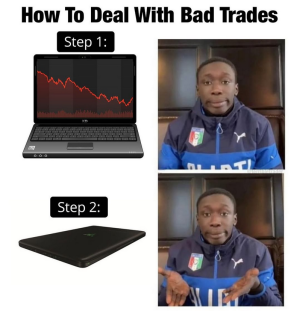HowTo:Cope with your trading Losses
MoNoRi-Chan's Guide to Coping with Trading Losses: "Just Deal With It"
Losses in trading are as inevitable as Mondays or realizing the burger you just bought is way overpriced compared to the food cart around the corner. The sooner you accept this truth, the sooner you can stop crying into your brokerage app at 2 a.m. and start learning to live with the pain. Buckle up, fellow traders—it’s time for a tough-love session from your favorite half-human, half-catboy market philosopher: MoNoRi-Chan.
Losses Are a Feature, Not a Bug
Let’s face it: losing money in the market is part of the game. The market doesn’t care about your Fibonacci retracements, your MACD signals, or your "I swear this is the bottom" gut feeling. It’s the financial equivalent of haggling at a night market—sometimes, you get the deal of the century; other times, you walk away holding overpriced knock-offs.
The secret? Acceptance. Not the "woe-is-me" kind of acceptance, but the "it is what it is" kind. Understand that the market is a cruel, indifferent beast. If it decides to put you in the loser’s basket, that’s just how the cookie crumbles. All you can do is manage your risk and not bet the house on that random altcoin your barber swore was the next Bitcoin.
Risk Management: The Unsung Hero
MoNoRi-Chan isn’t here to tell you that risk management is your saving grace—because you already know that. The problem isn’t the concept; it’s you.
If you're losing six figures on leverage (looking at you, random $TRUMP bagholders from Crypto Twitter), that’s not a market problem—that’s a you problem. Did you consider position sizing? Did you use stop-loss orders? Did you even glance at your risk-to-reward ratio before YOLOing?
MoNoRi-Chan, with over 13 years of trading wisdom under his belt, never risks more than $2 on a $100 account. Yes, that’s barely the price of a cheap coffee, but here’s the thing: that discipline scales. Whether it’s $100 or $100,000, the principle stays the same: risk only what you can afford to lose. If you’re out here risking your rent money or your mom’s savings, you’re not a trader—you’re a gambler.
The Comfort Zone of Loss
Not all losses are created equal. A $10 loss might sting if you’re broke, but a $1,000 loss might barely tickle if you’re running a fat portfolio. The key is to keep losses in your comfort zone.
Ask yourself: "If this trade goes south, will I still sleep at night?" If the answer is no, dial it down, hero. The market isn’t going anywhere, but your peace of mind is priceless.
For the Degens Who Lost It All
For those of you out there who blew six-figure accounts on some ridiculous gamble, MoNoRi-Chan has one word:
"Play stupid games, win stupid prizes."
What did you expect? That the market would bend to your will just because you “did your research” on some meme coin or penny stock? Mr. Market doesn’t care about your diligence. The hard truth is, if you’re consistently losing large sums, your risk management is trash.
And no, MoNoRi-Chan doesn’t feel sorry for you. Harsh? Maybe. But as a seasoned trader who’s built a career on disciplined, calculated trades, he’s not about to weep for those who go full leverage on a whim and then act shocked when the account hits zero.
Trading Is a Skill, Not a Lottery Ticket
The bottom line? Trading isn’t about striking it rich overnight. It’s about patience, strategy, and humility. If you’re not willing to treat it as a skill to be honed over time, you’re better off buying scratch cards or heading to the nearest casino.
Take it from MoNoRi-Chan: no one ever “makes it” in trading without taking losses. The winners are the ones who learn from them and come back sharper, not the ones crying over spilt altcoins on social media.
So, next time you blow a trade, don’t blame the market, don’t blame the broker, and definitely don’t blame your astrology trading guru. Just deal with it, reflect on what went wrong, and try not to make the same mistake twice.
Remember, the market doesn’t owe you anything. But with enough discipline and strategy, you might just carve out a small piece of the pie—and most importantly, keep it.
Good luck out there, traders. And remember: risk less, vibe more.
